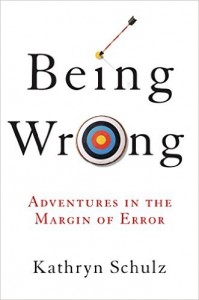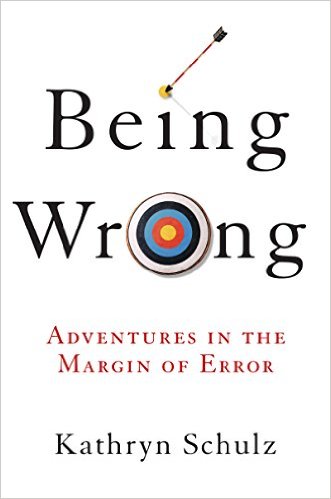 In this two-part episode, Brian Dillman, Julienna Viegas-Haws, and Anna Smith join Mormon Matters host Dan Wotherspoon in a discussion about “being wrong!” Or make that Being Wrong: Adventures in the Margin of Error (CCC, 2010). It’s a rich subject and wonderful book, and each of the panelists share favorite insights from their encounters with the things Schultz talks about and how those have helped them understand themselves, others, and many more areas of life much more clearly–and helpfully. Since this is Mormon Matters, after all, they also speak about the ways some of these ideas are in tension with certain ideas and various cultural habits (ways of thinking) in Mormonism. How does the material discussed impact their views on the methodology that we are taught in Mormonism’s D&C 9:8-9 (“study it out in your mind; then you must ask me if it be right” along with burnings in bosoms and stupors of thought)? With Mormonism’s emphases on and teachings about the Gift of the Holy Ghost and how it is a sure guide to what is “true”? With the Alma 32 passages on faith as a seed and “experimenting upon the word” and coming to know that a seed is good? With it’s emphases on the superiority of “knowing” over “believing” when it comes to one’s testimony. It’s a great discussion!
In this two-part episode, Brian Dillman, Julienna Viegas-Haws, and Anna Smith join Mormon Matters host Dan Wotherspoon in a discussion about “being wrong!” Or make that Being Wrong: Adventures in the Margin of Error (CCC, 2010). It’s a rich subject and wonderful book, and each of the panelists share favorite insights from their encounters with the things Schultz talks about and how those have helped them understand themselves, others, and many more areas of life much more clearly–and helpfully. Since this is Mormon Matters, after all, they also speak about the ways some of these ideas are in tension with certain ideas and various cultural habits (ways of thinking) in Mormonism. How does the material discussed impact their views on the methodology that we are taught in Mormonism’s D&C 9:8-9 (“study it out in your mind; then you must ask me if it be right” along with burnings in bosoms and stupors of thought)? With Mormonism’s emphases on and teachings about the Gift of the Holy Ghost and how it is a sure guide to what is “true”? With the Alma 32 passages on faith as a seed and “experimenting upon the word” and coming to know that a seed is good? With it’s emphases on the superiority of “knowing” over “believing” when it comes to one’s testimony. It’s a great discussion!
Please listen and then share your thoughts in the comments section below! Use either the World Table commenting system or the regular one (or place your comments in both). To learn more about the World Table and why we are helping it in its initial roll-out, please click on this short video.
_____
Links:
Kathryn Schulz, Being Wrong: Adventures in the Margin of Error (New York: CCC, 2010)
Kathryn Schulz, “On Being Wrong,” TED talk, March 2011
Kathryn Schulz, “Don’t Regret Regret,” TED talk, November 2011
Carol Tavris and Eliott Aronson, Mistakes Were Made (But Not by Me): Why We Justify Foolish Beliefs, Bad Decisions, and Hurtful Acts (New York: Harcourt, 2008)
Robert A. Burton, On Being Certain: Believing You Are Right Even When You’re Not (New York: St. Martin’s Press, 2009)


Comments 4
Just listened to President Eyring’s Conference talk on the Holy Ghost. I’m still having a difficult time wrapping my head around how your panelists justify their stances with the “Follow the Prophet” mentality of the general Church and leaders. It is liberating to consider that “Being Wrong” is an option but how does one assimilate this major construct change into core teachings of the Church?
As far as I am concerned, if what my conscience/holy ghost tells me aligns with the GAs great but if not I will follow my conscience. My relationship to God/Christ/Holy Ghost precedes my relationship to the Brethren.
Julienna: Exactly! Well said. I did a search on the lds.org web site for the phrase “follow the spirit”. Interestingly, that phrase comes up orders of magnitude more often in General Conference talks, etc. than does the phrase “follow the prophet”. It is important TO follow the prophet, but the only way we CAN follow the prophet successfully is to receive a witness of the truth by the SAME Holy Spirit that witnesses truth to the prophet.
I think it was Anna (?) that said something around the 45 min mark in episode 300 that made me stop in my tracks because it was that powerful. I had to go back and write it down because she hit the nail on the head in the most important way (for me anyway). She said (regarding leader fallibility):
“So how do you deal with leadership who, it’s really tricky for them to deal with fallibility because they’re supposed to be speaking for God. So part of it for me is, I can be compassionate and stuff, but I’m also going to be really careful about who I allow to have power in my own mind and heart, especially those people who are telling me to NOT trust my mind and heart if I get an answer that disagrees with them.”
“Especially those people people who are telling me to NOT trust my mind and heart if I get an answer that disagrees with them” is the part that made stop in my tracks. So so so so true. And such a perfect description of what I feel like my own experience has been for the last few months that I’ve moved further away from Mormon belief. Whether it be a family member, a friend, a church leader, etc, there is a powerful message coming at me that I shouldn’t trust my own mind and heart or what I believe have been as equally powerful manifestations from God as any I would have labeled as such in my Mormon believing paradigm that I’m on the right path. So go figure. That’s why I LOVED this quote from the conversation. It said so much of what I am experiencing myself, and of a way to handle it all that really resonated with me.